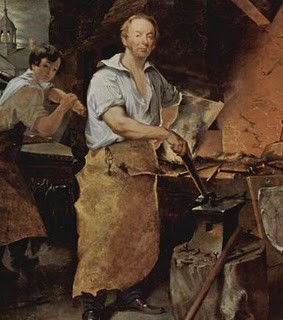vendredi, 18 décembre 2009
Distributisme in de 21ste eeuw
 Distributisme in de 21ste eeuw
Distributisme in de 21ste eeuw
Een interessante tekst voor zij die eens buiten het liberale of marxistische kader willen stappen:
http://www.humanitarianchronicle.com/2008/12/distributism-for-the-21st-century/
After more than a century, attempts to apply Capitalism and Socialism have met with the same disastrous outcome. A select group possesses everything while the majority is either bound to stale and declining wages, or worse, they slide from poverty to destitution. One model achieves this by appealing to individualism, while the other to collectivism. Yet for all their superficial differences, Capitalism and Socialism have much in common. Both bar the laborer, who produces the goods of society, from the means of production. Both discount the role of justice, restrict true freedom, and consolidate power. Both take for granted the materialism of man to the exclusion of his eternal soul.
Due to growing discontentment with these systems, people are turning to alternatives in the hopes of solving our financial dilemmas. A rising popular philosophy involves nurturing individual initiative and social responsibility, while using the resources of the local marketplace to challenge our current shift towards globalization. It steers town and country in the direction of the small shop instead of the multinational business, invests in local farming, and small-scale technology. Most importantly, it evaluates economic practices by how well they serve the family, subordinating material development to their spiritual growth, because production is made for man, not the other way around.
The name of this movement is Distributism.
In the early twentieth-century, Christian writers G.K. Chesterton and Hilaire Belloc, influenced by the first Catholic social encyclical Rerum Novarum (On the Condition of Workers, issued in 1891), created a social and economic theory they coined Distributism in an attempt to put this groundbreaking text to work. Writing in response to the social injustices suffered by working families—due to the upheaval of the Industrial Revolution—Pope Leo XIII published this document addressing the conditions related to work and capital.
A living wage, the Roman Pontiff declared, is necessary so that employees might support their families and practice thrift. Income is for the ownership of the supreme stabilizing instrument for the family: the foundation of property. “If working people can be encouraged to look forward to obtaining a share in the land, the consequence will be that the gulf between vast wealth and sheer poverty will be bridged over, and the respective classes will be brought nearer to one another.” (Rerum Novarum §47)
Voor de rest van de tekst verwijs ik naar bovenstaande verwijzing.
00:10 Publié dans Economie | Lien permanent | Commentaires (0) | Tags : économie, alternative, distributisme |  |
|  del.icio.us |
del.icio.us |  |
|  Digg |
Digg | ![]() Facebook
Facebook



Les commentaires sont fermés.